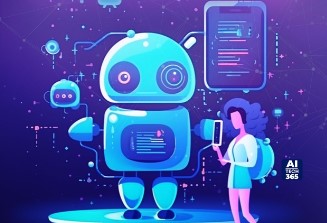Have you ever interacted with Alexa or ChatGPT? If so, you've engaged with conversational AI chatbots. But what makes them so popular, and why should businesses embrace them?
That's precisely what we'll explore in this piece. With the conversational AI chatbot market projected to grow at a rate of 23.6%, these AI-driven chatbots are emerging as a novel mode of communication.
So, what exactly is a conversational AI chatbot?
It's the fusion of artificial intelligence, natural language processing (NLP), and machine learning (ML) technologies. This amalgamation aims to imbue chatbots with enhanced intelligence, enabling more human-like interactions. Conversational AI specialists continuously learn, recognizing patterns and offering suggestions based on user inputs and accumulated conversations.
Research indicates that using conversational AI chatbots can boost agent productivity by 94% and resolve 92% of customer issues more swiftly. Moreover, 34% of customers find interacting with AI chatbot customer service comfortable. Chatbot-powered conversational interfaces are revolutionizing user-technology interactions, fostering natural and engaging dialogues. This translates to enhanced productivity, increased sales, and superior customer experiences.
But what sets a chatbot apart from conversational AI? While both serve similar purposes, chatbots are automated messaging systems that engage users via voice and text, whereas conversational AI employs more sophisticated technology to simulate human-like conversations.
Over 91% of chatbot interactions successfully resolve issues from start to finish. Consequently, businesses are increasingly adopting conversational AI to offer human-like customer experiences. With advancements in technology, chatbot integration is poised to provide humans with a competitive edge.
Why are businesses increasingly turning to AI chatbots? Several reasons drive this trend:
Enhanced customer service: Chatbots provide round-the-clock support, promptly addressing queries and offering seamless assistance, thereby enhancing satisfaction levels.
Improved efficiency and productivity: By automating repetitive tasks, chatbots free up human agents to focus on more complex issues, boosting operational efficiency.
Cost savings: Chatbots contribute to significant cost savings by handling high volumes of inquiries without the need for additional staff.
Increased sales and revenue: Chatbots engage customers, offer personalized recommendations, and guide sales processes, resulting in boosted sales and revenue.
Personalized interactions: AI chatbots understand natural language and context, offering tailored experiences that improve customer satisfaction and loyalty.
As businesses transition operations online through digital transformation, chatbots become indispensable tools for providing assistance, recommendations, and process automation across digital channels, ensuring seamless user experiences.
Gemini (by Google):
Gemini boasts advanced natural language processing (NLP) capabilities, seamlessly integrating with Google services to provide comprehensive and informative responses.
ChatGPT (by OpenAI):
ChatGPT excels in generating human-like text across various formats, making it a versatile tool for content creation and automation.
Amazon Alexa:
Alexa, a household name, offers contextual understanding and seamless integration with smart home devices, providing natural and interactive conversations.
IBM Watson Assistant:
Watson Assistant elevates customer and employee experiences with its intuitive interface, seamless integration, and personalized responses.
HubSpot Chatbot:
HubSpot Chatbot simplifies lead qualification and customer support processes, offering real-time insights and automation features.
ManyChat:
ManyChat specializes in creating chatbots for Facebook Messenger, assisting with customer service, marketing, and sales processes.
Zendesk Chatbot:
Zendesk Chatbot integrates seamlessly with Zendesk's customer support suite, streamlining communication channels and automating ticket management processes.
In conclusion, conversational AI chatbots are reshaping how businesses engage with customers, offering personalized support and seamless interactions. These chatbots automate tasks, mimic human-like responses, and integrate with various systems to enhance customer service, ultimately improving the overall user experience.





Comments